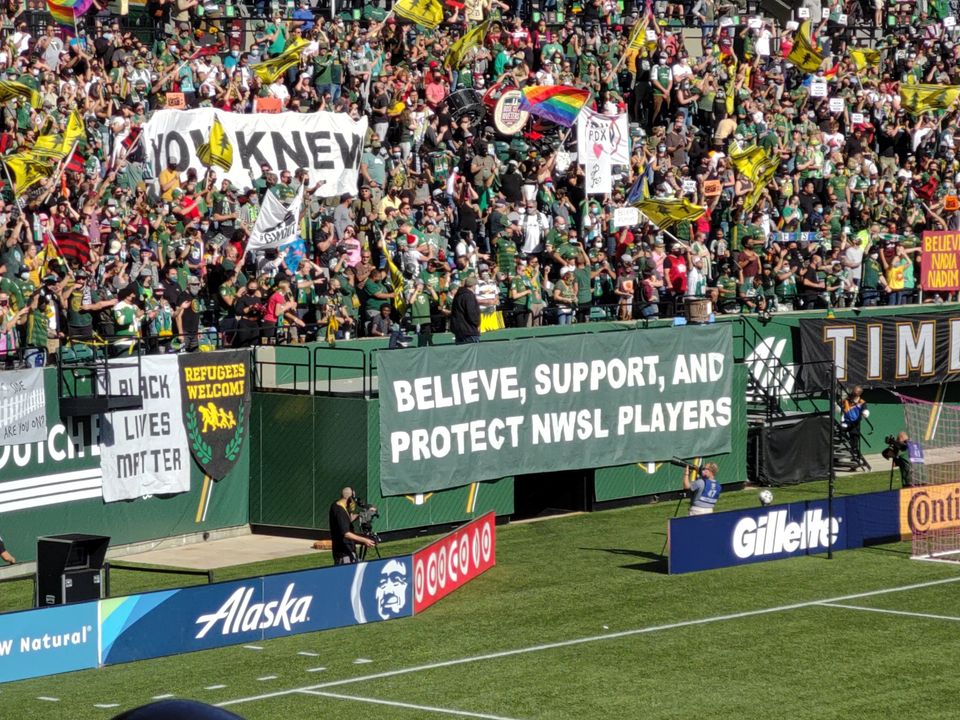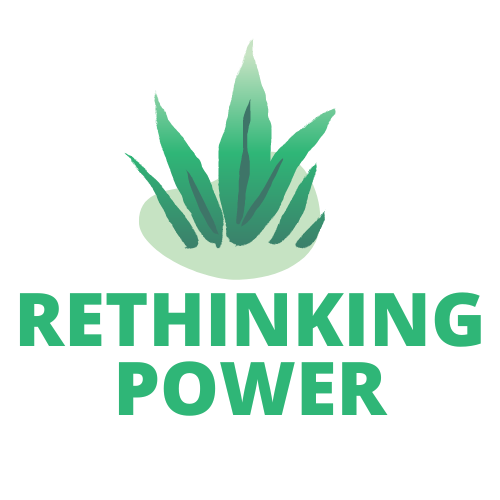Power and Domination in the National Women's Soccer League

Sometimes, you just want someone to tell you what to do.
I feel this way all the time. When I go to the doctor, I want them to tell me how to stay healthy. At tax time, I wish I had an accountant to take all the decisions out of my hands. When colleagues volunteer to lead projects we're both working on, I'm usually grateful rather than annoyed.
I play on an extremely chill soccer team. When the captain, Pat, asked me to join, I warned him: "I've never been more out of shape in my life, and I haven't played in twenty years." He replied: "That's fine. We don't care much about winning."
As captain, Pat has a few responsibilities. He reminds us about games and makes sure we have enough players. He also picks the starting formation---who gets to play first, and where. He does this by asking people where they want to play, and if they wouldn't mind waiting to come in. He's not really ordering us around, but he is making decisions, and it's helpful to have just one person in charge of that.
Michel Foucault[1] claimed that power relations are inevitable:
"I don't believe there can be a society without relations of power, if you understand them as means by which individuals try to conduct, to determine the behaviour of others. The problem is not of trying to dissolve them in the Utopia of a perfectly transparent communication, but to give one's self the rules of law, the techniques of management, and also the ethics, the ethos, the practice of self, which would allow these games of power to be played with the minimum of domination."
Foucault divided power relations into two kinds: "strategic relationships," and "states of domination." Strategic relationships can be mutually beneficial, like those of a teacher and a student, a doctor and patient, or a soccer captain and his team. States of domination are when power relations become inflexible and inescapable. We give power away constantly; states of domination are when we can't get the power back.
So how do states of domination arise?
I started playing soccer again after twenty years because I was inspired by the National Women's Soccer League, the top women's league in the US. The NWSL teams I watch are a lot more serious about soccer than my team. They actually care about winning, for one thing. They have a whole structure around making decisions: a legal owner or owners, a general manager, and a coach.
This makes perfect sense. The average player doesn't want to think about ticket sales or trade deadlines. And they might care about strategy, but they also want to play all the time, so it's good to have a coach who can tell them when they're pushing themselves too much or when someone else will do a better job. It's good that the coach can tell them what to do.
At least, it's good sometimes.
Last year, five coaches—a full half of the coaches on the NWSL's ten teams—were fired or asked to resign. The allegations ranged from making inappropriate comments about player fitness to racial abuse to sexual coercion of players. In several cases, the allegations had been known internally to owners for years, while the coaches continued on in their positions of power.
I think it is fair to say that the NWSL has been locked into a state of domination.
According to Foucault, states of domination are characterized by power relations that have become rigid and inflexible. This often happens through the process of institutionalization. Foucault scholar Joanna Oksala[2] explains:
"Even though power relations are essentially fluid and reversible, what usually characterizes them is that they have become stabilized through institutions. This means that their mobility is limited, and that there are strongholds that are difficult to suppress because they have been institutionalized. In other words, the strategic relations between people have become rigid."
The NWSL as an institution has a number of problems. As in many for-profit companies, majority ownership is held by a small number of people. In the NWSL's case, the governing body is the Board of Governors, made up of the owners from each team. The team owners are also the league owners, and there's little that can hold them accountable.
A player who is contemplating turning to an owner for help must weigh the fact that the owner can end their career. That's what appears to have happened in Portland, where Thorns owner Merritt Paulson faces allegations that he covered up the sexual coercion of players on his team.
The Board of Governors has made no move to suspend or censure Paulson. Nor did they intervene in the ownership battle for the Washington Spirit between Steve Baldwin, who hand-picked coach Richie Burke despite existing abuse allegations, and Michelle Kang, who the Spirit players unanimously endorsed to take over the team.
The NWSL Board's fecklessness is predictable, and a perfect example of how power relations become inflexible when institutionalized. A healthy organization would find a way to take power out of the hands of people like Baldwin and Paulson, but the legal structure of the NWSL makes that extremely hard.
Law is not the only force that can rigidify power relations. Norms and culture also come into play. Sexism, racism, and issues of wealth and sustainability continue to impact the NWSL. Women soccer players, unlike their male counterparts, rarely make enough to live on. Speaking out doesn't just risk their careers, it risks their homes and their financial stability. There's also a "culture of paternalism," in the words of Gotham star Midge Purce:
"Players are treated as if they're children, as if they're not adults who get to make decisions for themselves. And sometimes staff and coaches and people who are higher up in the authority or the hierarchy in the league feel that they can tell players what to do in inappropriate spaces."
Another structural issue contributing to the NWSL's state of domination is the inability of players to leave.
Anthropologists David Graeber and David Wengrow[3] document how, historically, the ability of people to physically leave abusive situations limited that abuse:
"[T]he Osage [...] used the expression 'moving to a new country' as a synonym for constitutional change. It is important to bear in mind that in this part of North America, populations were relatively sparse. There were extensive stretches of uninhabited territory (often marked by ruins and effigies, their builders long since forgotten), so it was not difficult for groups simply to relocate. What we would now call social movements often took the form of quite literal physical movements. [...] the only kings that could exist were always, in the last resort, play kings. If they overstepped the line, their erstwhile subjects could always ignore them or move someplace else. The same would go for any other hierarchy of offices or system of authority."
Freedom of movement is the ultimate check on power. If dysfunctional power relations cannot be reformed, then they can be dissolved. But freedom of movement isn't as simple as being able to walk away, not these days.
The NWSL, like most other American sports, is a government-sanctioned monopoly. There is no real alternative for players who want to play professionally in the US. Players can move to international leagues, but only if their contracts allow them, and only if they find a team that will sign them and pay them enough to live on. There's also no assurance that international leagues will treat them any better. USWNT superstar Lindsay Horan has spoken out about how her coach in France, Farid Benstiti, controlled her body weight in an abusive manner. Benstiti was later hired by NWSL team OL Reign—one of the five coaches let go/fired last year.
Between the governance structure of the league, the financial vulnerability of the players, the ingrained racism and sexism, the paternalism, and the inability to exit thanks to monopolistic practices and poor conditions abroad, it is easy to feel hopeless. But there is one bright spot: the growth of collective organizing in the league.
One of the most important forces in combating abuse has been the NWSL Players Association. Founded in 2017, the NWSL's fifth year, the NWSLPA became an official union in 2018 and signed their first collective bargaining agreement just last month. While the players are not part of the formal governance of the league, the NWSLPA provides a check on the owners' power, and the CBA helps institutionalize those checks.
Thanks to the new CBA, starting in 2023, players with six years or more in the league will be granted free agency—the right to choose where they play. In 2024, that limit will be lowered to five years, and players with three years will have limited free agency. This will at least allow some players to leave individual teams that are particularly bad environments. The CBA also gives players up to six months of paid time off for mental health reasons, which may allow players to temporarily remove themselves from environments which are toxic enough to be causing mental health issues.
Are these changes enough? They are surely much better than nothing, and just as surely not as good as true co-governance would be. It's hard to say whether the NWSL has turned a corner, or whether we can expect to see abusive situations continue throughout the league.
For those of us who are fans and outsiders, the question of how we can help support players is a tricky one. Fan protests last year likely helped, and it's important that we continue to be vocal about ongoing situations, as well as sexism, racism, and paternalism in the league. But for long-term change, we also need to think about how we can act to increase the agency of the players. Because as long as the league's owners and coaches hold such rigid, inflexible power over players, there will always be further abuse.

Member discussion